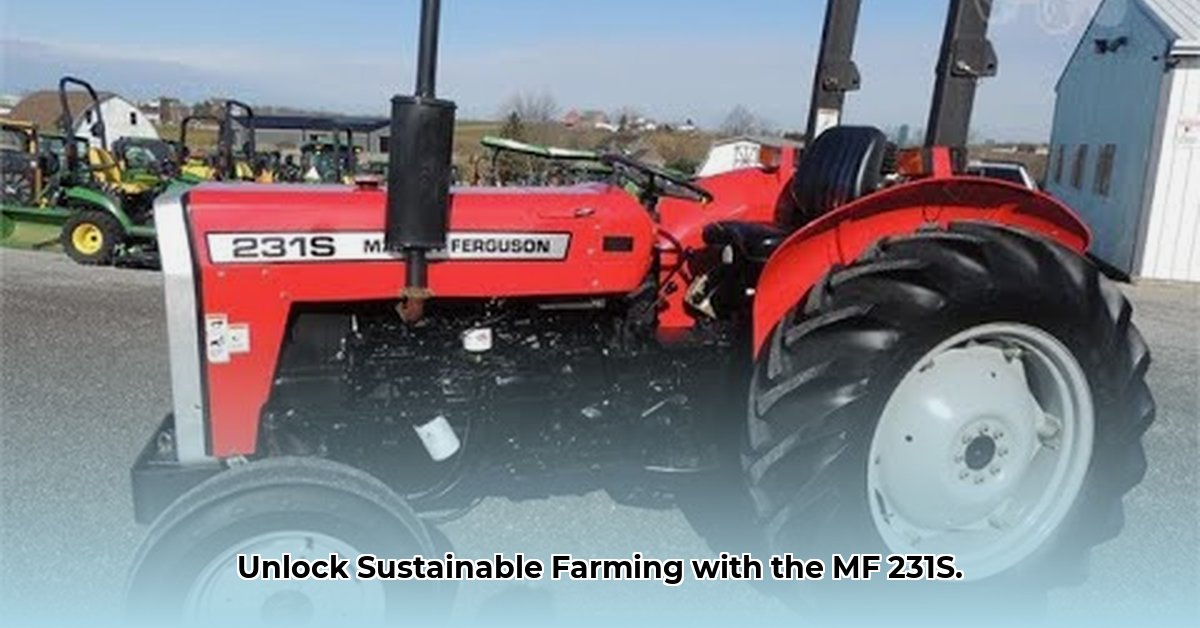
The Massey Ferguson 231S tractor, a stalwart of agricultural history, presents a compelling case for sustainable farming practices. While modern tractors boast advanced technology, the MF 231S offers a surprisingly relevant alternative, particularly for smaller-scale operations prioritizing affordability and durability. This guide explores its strengths and weaknesses, provides actionable advice for various stakeholders, and offers strategies for mitigating potential risks. By understanding its capabilities and limitations, farmers and policymakers can harness the MF 231S’s potential for environmentally responsible farming. For more information on Massey Ferguson small tractors, see this helpful resource.
Technical Specifications and Overview
The MF 231S isn't about bells and whistles; it's a practical workhorse. Its 45-horsepower engine (sufficient for many smaller farms) coupled with a 12.7-gallon fuel tank provides a workable balance between power and range. Its relatively simple design—compared to modern tractors—translates to fewer potential points of failure, increasing its longevity and simplifying repairs. This simplicity contributes to its overall sustainability by reducing the environmental impact of frequent replacements and complex repairs.
Sustainability Assessment: A Balanced Perspective
The MF 231S's suitability for sustainable agriculture requires a balanced assessment of its advantages and drawbacks.
Environmental Advantages:
- Exceptional Durability: Known for its robust build, the MF 231S boasts a significantly longer lifespan than many modern tractors, reducing the environmental impact associated with frequent replacements and the associated manufacturing process. Isn't reducing waste a key pillar of sustainability?
- Simplicity Promotes Repairability: Its relatively uncomplicated design makes repairs easier and often cheaper. This reduces reliance on expensive specialists and minimizes downtime, contributing to its overall efficiency and reducing the environmental impact associated with transporting parts and services. This straightforward design represents a significant advantage in terms of sustainability.
- Versatility and Adaptability: The MF 231S, with appropriate attachments, handles a wide range of tasks, from plowing to hauling. This versatility reduces the need for specialized machinery, lowering overall resource consumption and environmental impact. Isn't minimizing equipment a cornerstone of efficient, sustainable agriculture?
- Lower Initial Cost: The lower initial cost of a used MF 231S makes it accessible to small-scale farmers, promoting equitable access to agricultural technology within a sustainable framework.
Areas for Improvement:
- Fuel Efficiency: Compared to modern tractors, the MF 231S consumes more fuel per unit of work. This higher fuel consumption necessitates strategies for minimizing operational costs and environmental impact. How can we address this substantial drawback?
- Power Limitations: Its 45 horsepower limits its suitability for large-scale operations or tasks requiring significant power. This limitation necessitates careful consideration of the scale of operations for which this tractor is appropriate.
- Lack of Modern Features: The absence of advanced emission controls and precision farming technologies (GPS guidance, etc.) impacts its overall environmental performance compared to newer models. However, this should not automatically disqualify it, especially for farms with different needs and scales.
Actionable Advice: Tailored Strategies
The MF 231S's potential hinges on its effective integration into various operational models. Tailored strategies are key for different stakeholders:
For Small-Scale Farmers:
- Prioritize Preventative Maintenance: Regular servicing is crucial, significantly extending the tractor's lifespan and optimizing fuel efficiency (reducing costs and environmental impact).
- Develop Basic Repair Skills: Learning basic repair techniques minimizes downtime, reduces repair costs, and fosters self-sufficiency. Have you considered the long-term benefits of developing these essential skills?
- Build a Support Network: Connect with other MF 231S owners to share knowledge, parts, and repair services, building a resilient and cost-effective community.
For Agricultural Service Providers:
- Specialize in Classic Tractor Repair: Become a specialized service provider for older Massey Ferguson models, leveraging the growing demand for repair expertise. This niche specialization can be both lucrative and environmentally responsible.
- Offer Maintenance & Repair Training: Provide training programs for farmers, promoting self-sufficiency and reducing reliance on expensive external technicians.
- Embrace Circular Economy Practices: Explore programs for parts recycling, refurbishment, and reuse, extending the tractor's lifespan and minimizing waste.
For Policy Makers:
- Incentivize Repair Over Replacement: Implement policies that incentivize the repair and reuse of older equipment over purchasing new, more resource-intensive models. Consider tax breaks or grants for repair services.
- Invest in Training for Classic Tractor Mechanics: Support training programs focused on equipping mechanics with the skills to service and repair older tractor models like the MF 231S.
- Promote Sustainable Equipment Choices: Encourage the use of appropriately sized equipment, such as the MF 231S, for smaller farms, promoting sustainable and resource-efficient agriculture.
Risk Mitigation: Addressing Potential Challenges
The MF 231S's success depends on proactively addressing potential risks:
| Risk Factor | Mitigation Strategies |
|---|---|
| Parts Availability | Cultivate relationships with specialized parts suppliers; utilize online communities for sourcing hard-to-find components. |
| Repair Expertise | Support local mechanics; invest in training initiatives for older tractor repair; build knowledge-sharing networks. |
| Fuel Efficiency | Optimize farming practices to minimize fuel usage; explore suitable biodiesel options (always check engine compatibility). |
| Emissions | Maintain the tractor meticulously to minimize emissions; explore carbon offsetting programs. |
Conclusion: A Sustainable Tool, Strategically Employed
The Massey Ferguson 231S offers a compelling pathway toward sustainable agriculture, particularly for smaller-scale operations. Its longevity, repairability, and affordability offer a significant environmental advantage when compared to the continuous cycle of purchasing and discarding newer models. However, successful integration demands careful planning, proactive maintenance, and a resourceful approach to mitigate potential risks. Its role in building a more sustainable and equitable agricultural system is undeniable, but strategic implementation is key to maximizing its benefits.
Further Resources
- [Link to a relevant agricultural journal or university research paper]
- [Link to a parts supplier specializing in older tractors]
- [Link to a resource on sustainable farming practices]